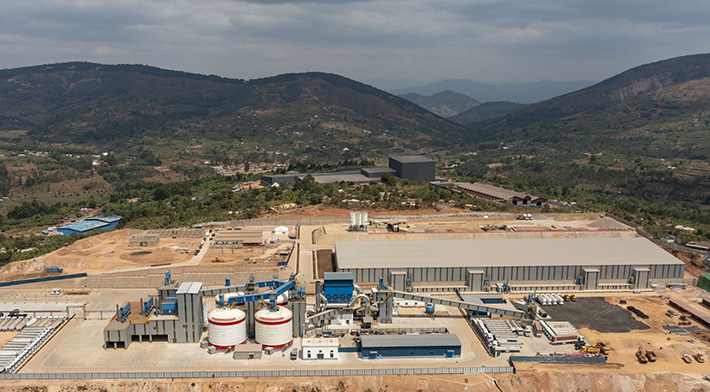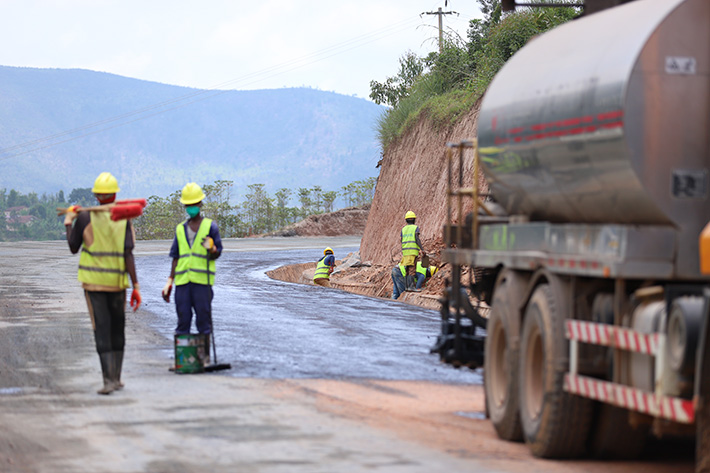|
||||||||||
| Home Top News Economy/Tech Culture/Sports China in Foreign Eyes Green Development Videos Intangible Cultural Heritages |
|
||||||||||
| Home Top News Economy/Tech Culture/Sports China in Foreign Eyes Green Development Videos Intangible Cultural Heritages |
| ChinAfrica |
| Factories of the Future |
| China’s investment is creating life-changing opportunities for Rwandans |
| By Alafati Mugabo | VOL. 17 July 2025 ·2025-07-09 |

View of the Anjia Cement Factory in Muhanga District, Rwanda, in August 2023 (RWANDAN PRESIDENCY)
In a significant development in the bilateral economic partnership, Chinese investors injected some $460 million into Rwanda’s economy in 2024. This accounted for 14.1 percent of all registered foreign capital in Rwanda, making China the country’s leading foreign investor.
According to a report from the Rwanda Development Board (RDB), Rwanda registered $3.2 billion in investment commitments in 2024, marking a 32.4 percent increase from the $2.4 billion recorded the previous year. The RDB said the growth signals rising investor confidence in the country’s economic landscape.
China’s investment isn’t just a transfer of funds - it is creating jobs for local people. Of the 51,635 jobs created through all investments, an estimated 7,282 are directly linked to Chinese-funded projects. For many Rwandans, these investments are more than numbers: they represent life-changing opportunities.
“I used to struggle to find steady work, but now I am employed at a Chinese-owned manufacturing plant in the special economic zone,” said Jean Paul Niyonzima, a 34-year-old resident of Masaka Sector in Kicukiro District.
“We were trained on the machines, and now we work in shifts. It’s stable and pays better than informal jobs. It’s not just a job; it’s stability for my family,” he added.
Made in Rwanda
The RDB report shows that the manufacturing sector attracted the largest share of investment - $1.35 billion - with Chinese investors playing a significant role. Their projects cover a wide range of sectors from textile factories and electronics assembly plants to construction materials.
RDB officials told ChinAfrica that Chinese businesspeople are setting up more and more small and medium-sized enterprises in the fields of construction, trade, restaurants, and digital services. These ventures not only diversify the investment landscape but also contribute to knowledge transfer and cultural exchange, they said.
During a visit to the RDB, ChinAfrica witnessed around 10 Chinese nationals handling the process of registering companies in Rwanda.
“It took me just two days to register my company,” said Jacky He, a Chinese national who recently launched Africa Prime Link Ltd., a car trading business in Kigali.
“I researched several African countries, but Rwanda stood out. It’s safe, stable, and the business registration process is incredibly efficient. I have decided to invest everything here first and then consider expanding to other parts of the continent.”
For Claire Umutoni, a 24-year-old graduate from Rwanda Polytechnic, the arrival of new companies brought an unexpected breakthrough. “I applied for a position as a machine technician and got it within two months of graduating. It feels good to use my skills here at home without needing to migrate abroad for work,” she said.
Many Rwandan employees praise the hands-on approach of Chinese investors. “What surprises me is that many of the Chinese investors are not just investing from afar, like those from Europe or other parts of Asia. The Chinese are on the ground, working with local teams and mentoring young Rwandans,” said a technician at a Chinese-run electronics assembly plant. “I’ve learned so much, and they treat us like partners in progress.”
Beyond manufacturing, Chinese capital has supported key sectors including infrastructure, transportation, and housing - areas that are essential for Rwanda’s ambition to become a regional hub for trade and tourism.
RDB’s Chief Executive Officer Jean-Guy Afrika stressed the broader impact of foreign investment: “Our strategy focuses on attracting investors who not only inject capital but also create decent jobs and build local capacity. China’s contribution exemplifies that vision.”
He added that Chinese entrepreneurs and professionals are increasingly relocating to Rwanda, drawn by its political stability, business-friendly environment, and strategic location. “We are not just welcoming capital; we are building a modern economy with partners who are willing to grow with us.”

Workers at a Chinese-led road rehabilitation project in Muhanga District, Rwanda, on 4 March (XINHUA)
Skills transfer
Economists say the continued partnership between Rwanda and China could bring more transformative projects. They stress the importance of training.
Théoneste Murenzi, an economic analyst and lecturer at the University of Rwanda, said recently, “The China-Rwanda partnership has moved beyond symbolic diplomacy to tangible economic impact - but it must now evolve to focus more on capacity-building.
Chinese investments have undeniably stimulated Rwanda’s industrial growth and employment numbers. But for long-term transformation, we must equip our workforce with technical and managerial skills.”
Another investment policy researcher echoed this sentiment: “The next phase of the China-Rwanda partnership must prioritise skills transfer and inclusive development. We need to see more deliberate efforts in training locals not just for basic manual work, but also for supervisory, engineering, and managerial positions. That’s how Rwanda will truly benefit from these investments and graduate to a knowledge-driven economy.”
A mini-survey conducted by ChinAfrica in construction sites and economic zones found that Chinese investment is clearly lifting thousands of Rwandans out of unemployment.
For now, Rwandans like Niyonzima and Umutoni are grateful for the opportunities that have emerged - a sign that, foreign investment can drive tangible, grassroots change.
| About Us | Contact Us | Advertise with Us | Subscribe |
| Copyright Beijing Review All rights reserved 京ICP备08005356号-5 京公网安备110102005860号 |